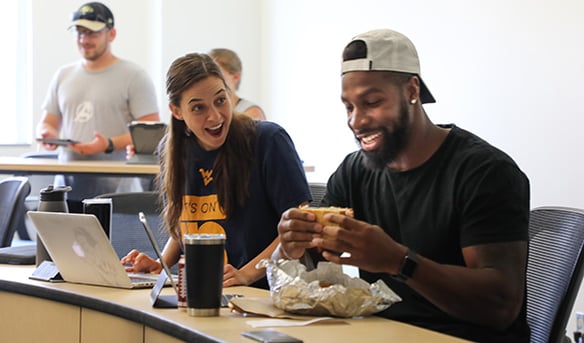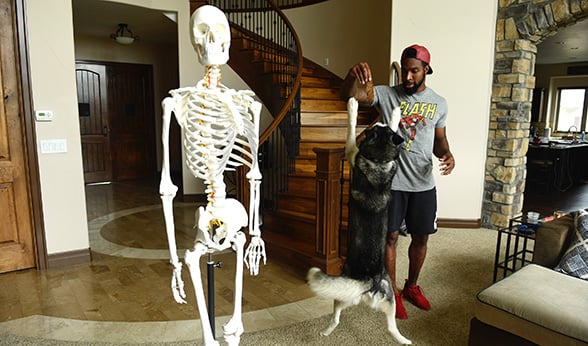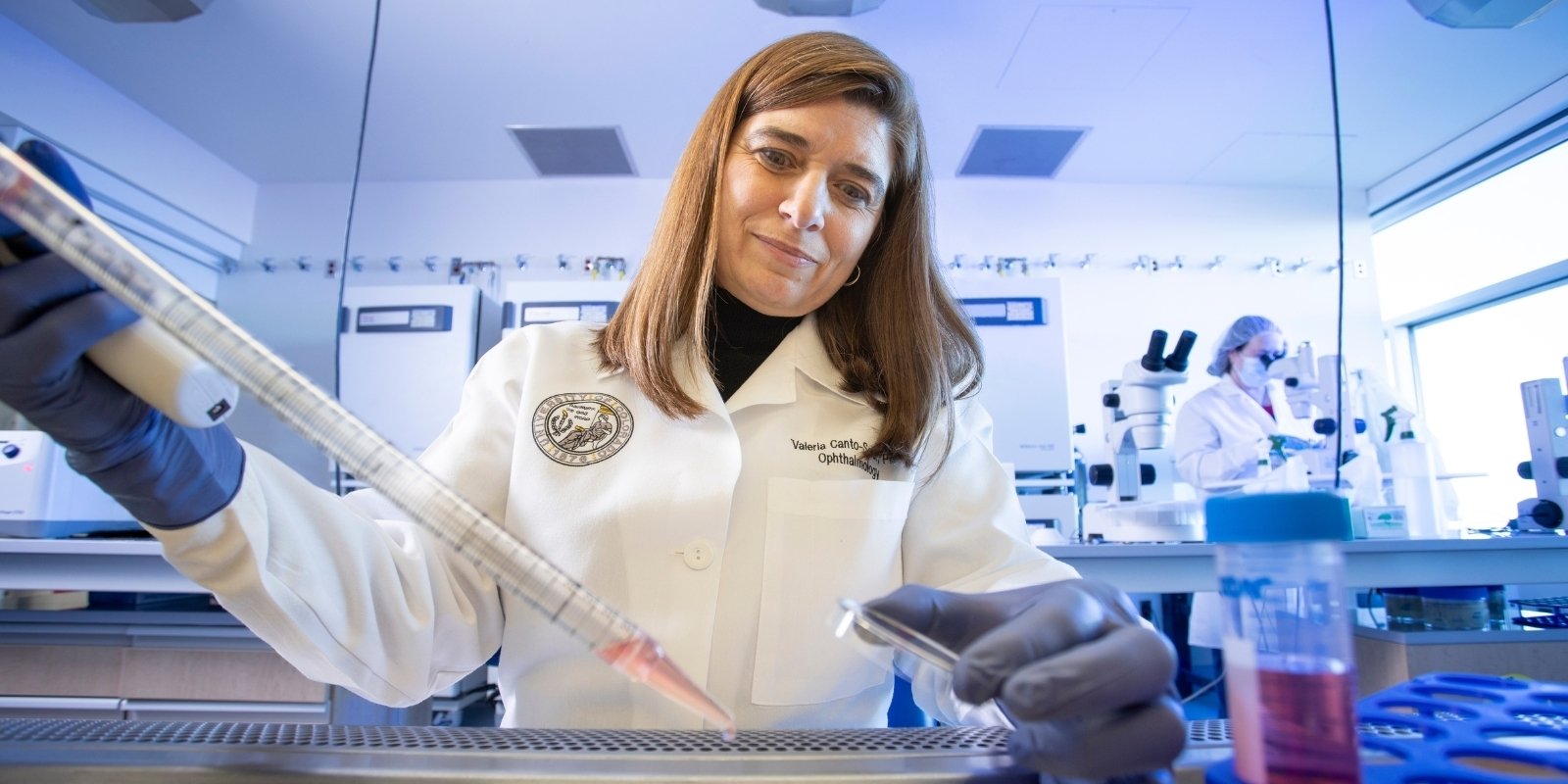In many ways, the current chapter of David Bruton, Jr.’s, life runs counter to his first career as a strong safety and Super Bowl 50 winner in the National Football League.
Where he once suited up in raucous NFL stadiums, Bruton now practices massage techniques in serene settings. Where he played a violent game on rapid-fire instinct, he now takes a thoughtful, analytical approach to evaluating the varying needs of each individual. Where his former employer, the Denver Broncos, expected him to dish out punishment, Bruton’s new mission is to become a licensed physical therapist so he can relieve pain and help young athletes get back in the game.
Bruton spent two years completing prerequisites at CU Denver and is now in the second semester of the Doctor of Physical Therapy Program in the CU School of Medicine. The 32-year-old Ohio native played for the Denver Broncos and a final season with the Washington Redskins; the eight-year span was four times longer than the average NFL career.

‘Seeing what his body has gone through’
Bruton frequently volunteers to be the “patient” in class or lab – offering up his shoulders or triceps for exam and evaluation, for example.
Michael “Mac” Mundie, a longtime classmate of Bruton’s, enjoys having the former pro athlete in the 69-member PT cohort. “It’s definitely interesting working with him – just seeing what his body has gone through in all those years with the Broncos. It makes labs more interesting,” he said.
Q&A
Bruton sat down with CU Anschutz Today for an interview in Education 2, his home away from home these days.
Today: Your physical therapy program at CU Anschutz is a departure from playing football. Did you have a turning point where you realized you wanted to retire from pro football and pursue a new career?
DB: In high school, I thought about becoming a physical therapist. Having multiple encounters with different PTs throughout my football career … kind of drove it home. I definitely had my share of concussions … I don’t remember having them at all. The last concussion (with the Redskins) was definitely like an ‘a-ha’ moment. I realized I have so much more to look forward to … and I didn’t want to worry about hurting myself to the point where I couldn’t pursue another career.
Today: Pro football takes a physical toll, and the unexpected retirement of Andrew Luck, the Indianapolis Colts quarterback, is another example of a star player stepping aside to avoid further injury. What were the physical demands like in the NFL?
DB: In my rookie year, I felt like I was in the training room 24-7. When I started in the league, we didn’t have limitations on training camp; they could have us out there for two-a-days in full pads. Nowadays, you have a padded practice, and then your second practice is a walk-through type of thing. They’ve made some strides … Still, I definitely had bumps and bruises – just constantly waking up and having to find a way to grind out every single day.
Today: You just started your second semester in the CU Physical Therapy program. What are you currently studying?
DB: Now, compared to the prerequisite courses, it’s more focused on what I want to do. Anatomy took up basically all of our lives in the first semester this summer. This semester, the classes, like neuroscience and human growth development, build on that and pertain to my second career.
Today: What do you enjoy about the program?
DB: I enjoy how we get to problem solve on a daily basis. No matter the class, we have to use some form of clinical reasoning as to how we arrived at prescribing a certain treatment, or why we’d use a certain modality, or what muscle tests we’d recommend. Of course, there’s a lot more to learn here. They do a great job of making sure that what we’re learning in one class is being reinforced in another class.
Today: What’s the hardest part of your studies so far?

DB: I struggle a bit with the ICF model (International Classification of Functioning, a framework for describing functioning and disability in relation to a person’s health condition). You’re interviewing a patient, but also remembering that you have all these different components to try to pull out (about their unique environment, activities, etc.) in a certain amount of time.
| BOOKWORM AT HEART |
| Helping to instill a love of reading in children is close to David Bruton’s heart. The David Bruton Foundation partners with Mile High United Way in Denver and United Way of Greater Dayton in Ohio (Bruton’s hometown) to promote childhood literacy. Bruton’s Books has donated over 20,000 books to those communities, as well as refurbished community reading boxes and established reading nooks geared toward youth. |
Today: Why did you choose CU for your academic program?
DB: A contributing factor was the relationship I built with UCHealth during my tenure with the Broncos (UCHealth is the official health care partner of the Denver Broncos). I knew about their state-of-the-art facilities as well as the different professional disciplines that are on the CU Anschutz Medical Campus, and how we would basically be learning from different professionals. That was a big driving force. I also have to think about my family (a fiancée and three children), and having the campus closer to home is a bonus.
Also, the professors are very welcoming. They have an open-door policy. They’ll dive into any type of question we have during class. We get to learn a lot more than just what’s in the text book – it’s very engaging. Also, the second- and third-year (students) are helping to guide us. Everyone is invested in you. They care about you and your well-being and your success.
Today: You were a three-year captain of the Broncos’ special teams and winner of the team’s Walter Payton NFL Man of the Year Award in 2015. Have you found an outlet for your leadership skills here at CU Anschutz?

Today: What do you envision for your career after graduation in December 2021?
DB: I want to focus on concussion and vestibular rehab, but in a sports-type setting, tailored toward young athletes. I’d like to bridge that gap between the whole family – the child athlete and their parents – and a neurologist or whatever specialist they may get referred to.
Today: Do you still have Fred the Skeleton at home as a study tool?
DB: I’ve still got Fred, and also Tim. Tim is our muscular one. I also have a massage table at home, so that’s all I do is practice my effleurage and petrissage techniques on the missus.
Today: Does she like that?
DB: Oh yeah. The other day she’s going, ‘Oh, my ankle!’ Meanwhile, I’m over here in the living room trying to watch the Notre Dame game (laughs).



